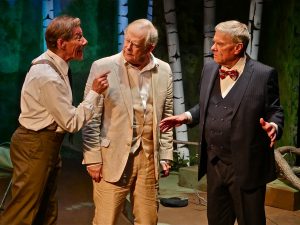By SCOTT BABA
Art and Entertainment Editor

In television there is a narrative device called the “bottle episode.” Originally conceived of as a way to cut costs, a bottle episode usually involves finding a way to keep the characters in a single location and giving them little to do besides bounce off of one another. Over time, bottle episodes have come to be seen as a way to distill characters and their relationships and explore them in a more in-depth way – by trapping the characters in one place and stripping them of distractions and external influences, there is nothing for the characters to react to but each other, and no tools for them to use but themselves.
Onstage Theatre’s new play at the Martinez Campbell Theater, “Camping With Henry and Tom,” is as pure and well-crafted a bottle episode as you’re likely to see.
Written by Mark St. Germain and directed by Randy Anger, the play is set during a real event that took place in 1921, when President Warren Harding (Mark Hinds) joined industrialist Henry Ford (Wayne McRice) and inventor Thomas Edison (Gary Mutz) on one of their regular well-publicized camping trips. Though the camping trip is a matter of historical record, St. Germain’s play imagines what might have happened if the three men had gone on a secret car ride in the woods and accidentally stranded themselves after hitting a deer with Ford’s car.
The entire play takes place in the clearing they find themselves in after crashing the car. As they debate how to proceed, whether to go for help or wait for it, and what to do about the injured deer, each character comes into focus.
Harding is a good man and a kind one, but perhaps too soft to be able to make the hard choices – when the three men agree to put the injured deer out of its misery, Harding goes to do the deed and then realizes he doesn’t have it in him to kill an animal.
Hinds shows his range with the roll, depicting Harding as both the friendly but distant presidential figure at the start of the play, and the more nuanced, more conflicted man who emerges from his shell later after the conversation takes a more combative turn.
Ford is brash and ambitious, and it emerges early on in the play that his entire reason for inviting the president on this trip is to coerce him into making a number of concessions, like selling the failing Muscle Shoals hydroelectric plant to Ford for pennies. While Ford is an industrialist and a capitalist, he is also an idealist, and believes that industry can – and should – be bent to the betterment of the country, and that he’s the man to do the bending.
McRice plays him as a man full of ambition and pride and empty of patience. Though he nailed the puffed-up ostentation of the character, McRice said he had a difficult time crafting the character.
“I found it pretty difficult to bring this guy to life on the stage,” said McRice. “I did the part about 25 years ago. But this time, now that I’m older, I did a lot more research, and what I discovered is: I don’t really like Henry Ford. He was not a particularly likable person. But I can’t possibly let that show through when I’m playing the character.”
Edison, meanwhile, desires staunchly to stay out of the political conversation – and indeed, most of the conversation. He’s gruff and asocial, and largely uninterested in interacting with his companions, mostly lobbing witty observations from over the top of his book.
Mutz said that he connected with the character.
“He’s one of the few characters who seem so close to me, because every time I talk about it with my wife, she says, ‘That is you, isn’t it? You just sit there, you’re curmudgeonly, and you throw out these one-liners at everybody.’”
There is not much in the way of physical action. Instead, as with most great bottle episodes, the heart of the episode is the back and forth conversational brawl. Ego grapples with ego, as does philosophies about leadership and governance, and as the play continues and deeper goals are revealed, the play becomes an exploration of the darker side of ambition and politics.
Though the play is almost entirely taken up with conversation, it never feels bogged down and is carried well by St. Germain’s dialogue, which is quick and natural and full of dry wit.
Director Randy Anger said that he understood the challenge of directing the conversation-heavy play.
“This show could be three people sitting in their chairs for two hours, and while you want to get them up and get them moving, you have to make it real.,” said Anger. “You have to make it so that when they stand up, and when they cross somewhere, and when they’re turning on someone, that it looks right and it doesn’t look like you’ve created a moment out of thin air. It’s really about motivation.”
Anger added that part of the solution was making sure the actors and their characters were very distinct. “You have to make sure that each one is very specific so you know that you don’t have three men of a certain age all acting the same and sounding the same. You have to make sure their timbre is different, you have to make sure their attitudes are clear – you have to let them play.”
There are obvious parallels between the characters on the stage and the current political climate. From Harding’s good-natured inability to get things done, to Ford’s belief as an outsider businessman that he – and only he – knows the right way to fix the country, the play is shockingly topical for something written over 20 years ago.
Mark Hinds, who originally brought the play to Onstage, said that its topicality was one of the things that interested him in putting on the play.
“It takes place a hundred years ago and yet it’s still relevant today,” said Hinds. “This is a very interesting glimpse into the past and an intriguing look at how times may change, but politics does not.”
“Camping With Henry and Tom” is a smart, funny, thoughtful character study that’s worth a watch.


